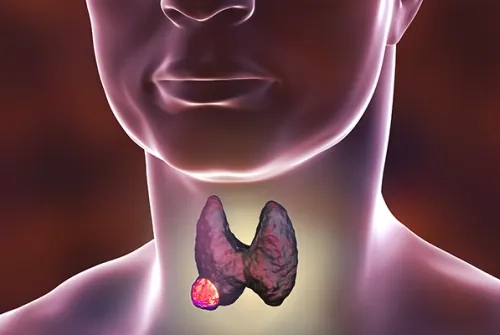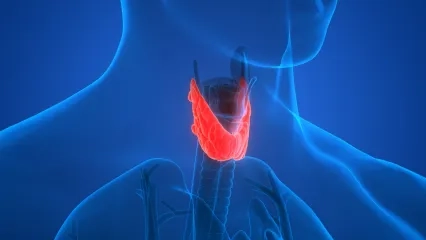Alo Yeditepe
Alo Yeditepe
Thyroid Nodules
Nodule is a word in the sense of gland, swelling, protrusion, and it is round, hard, swelling that occurs inside the thyroid gland. Their size can vary from several millimeters to several centimeters. Their number varies; they may be the only ones or might be dozens. The most important feature of the nodule is that it carries the risk of cancer. However, it should not be forgotten that only 5% of all nodules are cancerous. In other words, patients with nodules should not put unnecessary stress on this issue. At this point, the important thing is to determine which nodules may be cancerous. Specialist physicians can do this.
What are the Symptoms of Thyroid Nodules?
While only 5 percent of the thyroid nodules show signs, 95 percent do not. This is why many nodules are often detected by chance. Although rare, the symptoms are swelling in the neck, difficulty swallowing, feeling stuck while swallowing, and palpable glands in the neck.
How are Thyroid Nodules Diagnosed?
Diagnosis is made by examination and ultrasonography. Ultrasonography provides important information about both the diagnosis of the nodule and its severity (whether it is at risk of cancer or not).
How are Thyroid Nodules Treated?
The treatment of thyroid nodules is determined by the ultrasound image of the nodule. No treatment is applied to nodules that do not give a small and risky image. It is monitored in 3 or 6-month periods. Needle biopsy is performed in nodules that are not large and give a risky appearance. If the nodule diameter is large or the ultrasound image carries a high risk of cancer, a direct surgical decision is made.
Are All Thyroid Nodules Cancer?
Never are! The probability of getting cancer in a thyroid nodule is only 5 percent. In other words, patients with nodules should not put unnecessary stress on this issue. The important thing is to determine which nodule may be cancerous. It is sufficient for patients with nodules to apply to physicians specializing in thyroid and endocrine diseases.
What is Thyroid Hormone Replacement Treatment?
In cases where the thyroid gland works less or the thyroid gland is removed by surgery, the treatment performed by swallowing the T4 hormone, which is one of the hormones secreted by the gland, in the form of a tablet, is called hormone replacement treatment.
This content was prepared by Yeditepe University Hospitals Medical Editorial Board.
”
See Also
- What is a Parathyroid Adenoma? Symptoms and Treatment
- What is Calcitonin Hormone? Calcitonin Hormone Deficiency
- If the Size of the Thyroid Nodule is Over 4 cm, Be Cautious!
- How Does High Calcium in Blood Cause Complaints?
- A First in the Literature: Parathyroid Cell Obtained from Thyroid Stem Cell
- Diagnosis in Thyroid Diseases
- Assessment of Hyperthyroidism
- Hashimoto's Thyroid Disease
- Thyroid Tumor (Cancer)
- Graves' Disease
- Thyroid Surgery
- Assessment of Hypothyroidism
- What is the Harm of High Calcium in the Blood?
- Frequently Asked Questions in Thyroid Diseases
- Atomic Therapy (Radioactive Iodine Therapy)
- Which Thyroid Nodule Can Be Treated Without Surgery?
- She Was Relieved of Her Pain When the Missing Parathyroid Gland Was Found in The Chest Cavity
- Thyroid Storm Can Turn Life Upside Down
- Recovered From Thyroid Nodule with Needle Melting Method
- Stress Triggers Thyroid Diseases; These Occupations Are At Risk!
- Turkish Physician Developed a Novel Method for Parathyroid Transplant
- What Should Be Considered After Parathyroid Surgery?
- Parathyroid Diseases and Treatment
- They Said It Was Thyroid Cancer, But It Turned Out to Be Parathyroid Adenoma!
- The Frequency of Thyroid Nodules and Thyroid Cancer in Young People is Increasing!
- Thyroid Cancer Treatment Is Possible Without Removing The Entire Thyroid Gland
- Thyroid Storm
- T4 Hormone in 13 Headings
- Questions About Thyroid Diseases
- Thyroid Diseases
- Goiter (Thyroid Gland) Biopsy
- Radiofrequency Therapy in Thyroid Nodules
- What Is Autoimmune Hypoparathyroidism or Hypocalcemia?
- What Is The Loss of Low Calcium Level in Blood?
- What Is The Symptoms of Calcium Level Elevation (Hypercalcemia)?
- How It Is Made The Parathyroid Adenoma Operation?
- What Is Parathyroid Hyperplasia?
- Parathyroid Tumors
- What Are The Parathyroid Glands?
- The Incidence of Thyroid Cancer Has Increased! There is Turkey in the Research!
- Key Surgery Performed In Turkish Hospital For First Time
Alo Yeditepe






